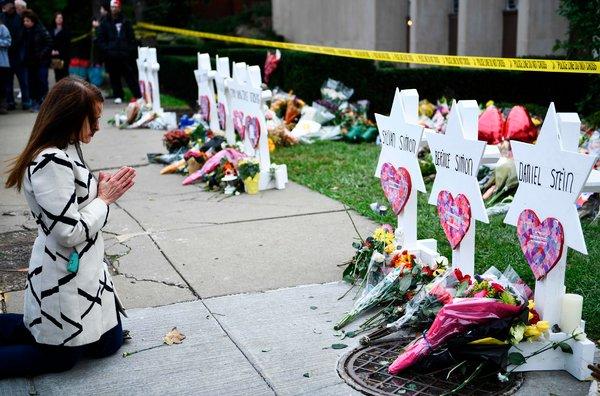“As soon as I realized what it was, it was get out of there or die,” Mr. Charney said.
He saw Mr. Bowers shoot four people, and he ran away quickly.
“I saw a big gun — I only looked at him for a couple of seconds, and I put two and two together,” Mr. Charney said.
He said he and the woman who had been reading scurried to a space on the third floor where “there are places to hide, because they are small.”
他說(shuō),他和那個(gè)之前讀書(shū)的女人匆匆跑到了三樓的一個(gè)地方,那里有“藏身的地方,因?yàn)樗麄兩聿亩己苄 !?/div>
He stood there with the woman, thinking of two things: “Keep your mouth shut and don’t breathe. It was very difficult.”
他和那個(gè)女人就站在那里,心里就想著兩件事:“閉緊嘴巴,屏住呼吸。好難的。”
When the first police officers arrived around 10 a.m., the gunman immediately began shooting at them.
當(dāng)?shù)谝慌煊谏衔?0點(diǎn)左右趕到時(shí),槍手立即開(kāi)始朝他們開(kāi)了槍。
“We’re under fire, we’re under fire,” said an officer, according to a transcript of the police radio scanner traffic.
根據(jù)警方的無(wú)線電掃描儀對(duì)話記錄,一名警官說(shuō):“我們受到了攻擊,我們受到了攻擊。”
“He’s got an automatic weapon, he’s firing at us from the synagogue.”
“他有一把自動(dòng)武器,他正從猶太教堂朝我們開(kāi)槍。”
Another officer reported: “We’re taking on AK-47 fire from out the front of the synagogue.”
另一名軍官報(bào)告說(shuō):“猶太教堂門口有人用AK-47朝我們開(kāi)火。”
Mr. Werber was hiding in the storage room with Ms. Black and with Mr. Wax.
韋爾貝先生和布萊克女士、瓦克斯先生一起藏在了儲(chǔ)藏室里。
“Mel Wax, blessed memory, couldn’t hear,” Mr. Werber said.
“梅爾文·瓦克斯,愿他安息,聽(tīng)力不好,”韋爾貝先生說(shuō)。
“He had hearing aids, but you had to shout to make him hear anything. And I wasn’t about to do any shouting.”
“他戴了助聽(tīng)器,但你還是得大聲喊他才能聽(tīng)見(jiàn)。而我又沒(méi)打算大聲喊他。”
After a long pause in the gunfire, Mr. Wax pushed the door open.
槍聲停了很久以后,瓦克斯推開(kāi)了門。
Three shots rang out, Mr. Werber said, and Mr. Wax’s body fell back into the room.
接著傳來(lái)了三聲槍響,瓦克斯先生的尸體倒進(jìn)了房間。
When the gunman came in, stepping over Mr. Wax’s body, no one said a word.
殺手進(jìn)來(lái)時(shí),直接踩在了瓦克斯先生的尸體上,沒(méi)人敢出聲。
Ms. Black was crouched near the door.
布萊克女士蜷縮在門邊。

Mr. Werber’s cellphone, an old flip phone, was unlit.
韋爾貝先生的手機(jī),一部老舊的翻蓋手機(jī),沒(méi)有發(fā)出任何光亮。
“If there had been any light, I would have been the center of the bull’s-eye,” he said.
“如果當(dāng)時(shí)有任何的光線,我應(yīng)該已經(jīng)成了殺手的靶子了,”他說(shuō)。
“I was just hoping he didn’t have a flashlight, or he just didn’t spray the back of the room for the hell of it.”
“當(dāng)時(shí)我只希望他沒(méi)帶手電筒,或者他不會(huì)掃射房間的后半部分。”
Instead, he walked out.
幸運(yùn)的是,他出去了。
At 10:55 a.m. the SWAT team encountered Mr. Bowers, up on the third floor where he had barricaded himself.
上午10:55,特警部隊(duì)遇到了鮑爾斯先生,在三樓他把自己圍起來(lái)的地方。
“Shots were still going off when I came out of the room,” an officer said on the scanner. “I believe he’s still alive.”
“我從房間出來(lái)的時(shí)候,槍聲還沒(méi)有停,”一名軍官在掃描儀上說(shuō)到。 “我相信他還活著。”
Eight minutes later, officers reported talking to Mr. Bowers.
八分鐘后,官員報(bào)告與鮑爾斯先生通過(guò)話了。
“Contact with the actor,” an officer said.
“聯(lián)系殺手,”一名官員說(shuō)。
“Spontaneous negotiations ongoing, communications effort to get him to come out, tell him we’re not going in.”
“我們正在和他進(jìn)行談判,我們和他通話讓他出來(lái),告訴他我們不會(huì)進(jìn)去。”
Officers exchanged gunfire with the suspect, and four police officers were wounded, three of them by bullets.
警員與嫌疑人交火,四名警察受傷,其中三人中彈。
“He’s been given orders to crawl out, crawl out,” an officer said. “He’s not done so yet.”
“我們下了命令讓他爬出來(lái),”一名軍官說(shuō)。 “現(xiàn)在他還沒(méi)有出來(lái)。”
At 11:08 a.m., the suspect finally surrendered, crawling toward the officers.
上午11:08分,犯罪嫌疑人終于投降,向軍官們爬去。
“Suspect’s talking about, uh, all these Jews need to die,” an officer said.
“嫌疑人嘴里說(shuō)著,呃,所有這些猶太人都得死,”一名官員說(shuō)。
“The suspect keeps telling about killing Jews, he doesn’t want any of them to live.”
“嫌疑人一直說(shuō)要?dú)⑺廓q太人,他不希望他們?nèi)魏我粋€(gè)人活在世上。”
譯文由可可原創(chuàng),僅供學(xué)習(xí)交流使用,未經(jīng)許可請(qǐng)勿轉(zhuǎn)載。


